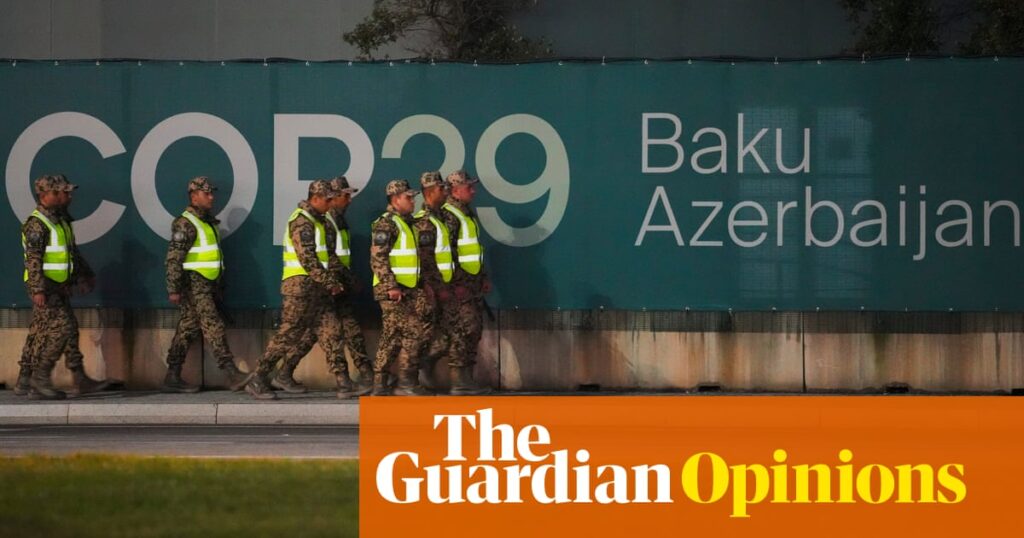During rapidly escalating climate and humanitarian crises, another authoritarian petrostate with no respect for human rights is hosting Cop29 – the UN’s latest annual climate summit that starts today and is being held after the re-election of a climate-denier US president.
Cop meetings have proven to be greenwashing conferences that legitimise countries’ failures to ensure a livable world and future and have also allowed authoritarian regimes like Azerbaijan and the two previous hosts – the United Arab Emirates and Egypt – to continue violating human rights.
Genocides, ecocides, famines, wars, colonialism, rising inequalities and an escalating climate collapse are all interconnected crises that reinforce each other and lead to unimaginable suffering. While humanitarian crises are unfolding in Palestine, Yemen, Afghanistan, Sudan, Congo, Kurdistan, Lebanon, Balochistan, Ukraine, Nagorno-Karabakh/Artsakh, and many, many other places, humanity is also breaching the 1.5C greenhouse gas emissions limit, with no signs of real reductions in sight. Instead, the opposite is taking place – last year, global emissions reached an all-time high. Heat records have been shattered, and this year is “virtually certain” to be the hottest year ever recorded, with unprecedented extreme weather events pushing the planet further into uncharted territory. The destabilisation of the biosphere and the natural ecosystems we depend on to survive is leading to untold human suffering and further accelerating the mass extinction of flora and fauna.
Azerbaijan’s entire economy is built on fossil fuels, with the state-owned oil company Socar’s oil and gas exports accounting for close to 90% of the country’s exports. Despite what it might claim, Azerbaijan has no ambition to take climate action. It is planning to expand fossil fuel production, which is completely incompatible with the 1.5C limit and the goals of the Paris agreement on climate change.
Many attenders of this year’s Cop are scared to criticise the Azerbaijan government. Human Rights Watch recently published a statement explaining how it couldn’t be certain that attenders’ rights to peacefully protest would be guaranteed. In addition, Azerbaijan land and sea borders will remain closed during Cop29, making it only possible to travel in and out of the country by air, which causes pollution and which many Azerbaijan citizens can’t afford. The reason given for closing borders at all Cops since the start of the Covid pandemic is to maintain “national security”, but I’ve heard many Azerbaijanis describe the situation as being “kept in a prison”.
The Azerbaijan regime is guilty of ethnic cleansing, humanitarian blockades and war crimes, as well as repressing its own population and cracking down on the country’s civil society. The independent watchdog Freedom House ranks the country as the least democratic state in Europe, with the regime actively targeting journalists, independent media outlets, political and civic activists, and human rights defenders. Azerbaijan also accounts for about 40% of Israel’s annual oil imports, thus fuelling the Israeli war machine and being complicit in the genocide in Palestine and Israel’s war crimes in Lebanon. The Azerbaijan-Israel ties are mutually beneficial as the majority of weapons used by Azerbaijan during the second Nagorno-Karabakh war and likely those used in the September 2023 military operation into the Karabakh region were imported from Israel.
The “Cop of peace” is one theme chosen for this year’s climate conference by the host, which wants to encourage states to observe a “Cop truce”. It is gut-wrenching, to say the least, to talk of global peace after the terrible human rights violations committed by Azerbaijan’s Aliyev regime against ethnic Armenians living in the Nagorno-Karabakh/Artsakh region. Furthermore, Azerbaijan is planning to greenwash its crimes against Armenians by building a “Green Energy Zone” on territories where the population has been ethnically cleansed.
How did this country get to host the climate summit? It was eastern Europe’s turn. But Russia vetoed EU member states, so the options were either Armenia or Azerbaijan. Armenia lifted its veto against Azerbaijan and supported its bid in exchange for a release of prisoners, although a large number of Armenian political prisoners are still being held. Last year, the regime critic Gubad Ibadoghlu was imprisoned after criticising Azerbaijan’s fossil fuel industry. Other political prisoners include peace activist Bahruz Samadov, ethnic minority researcher Iqbal Abilov, political activists Akif Gurbanov and Ruslan Izzatli, and TV journalists.
Meanwhile, the EU continues to buy fossil fuels from Azerbaijan and plans to double its import of fossil gas from the country by 2027.
The climate crisis is just as much about protecting human rights as it is about protecting the climate and biodiversity. You cannot claim to care about climate justice if you ignore the sufferings of oppressed and colonised people today. We cannot pick and choose whose human rights to care for, and who to leave behind. Climate justice means justice, safety and freedom for everyone.
During Cop29, the picture of Azerbaijan reported by the media will be a whitewashed and greenwashed version that the regime is desperate to portray. But make no mistake – it is a repressive state accused of ethnic cleansing.
We need immediate sanctions targeted against the regime and a halt to the import of Azerbaijani fossil fuels. Diplomatic pressure must also be put on the regime to release its Armenian hostages and all political prisoners – and ensure the right to a safe return for Armenians.

